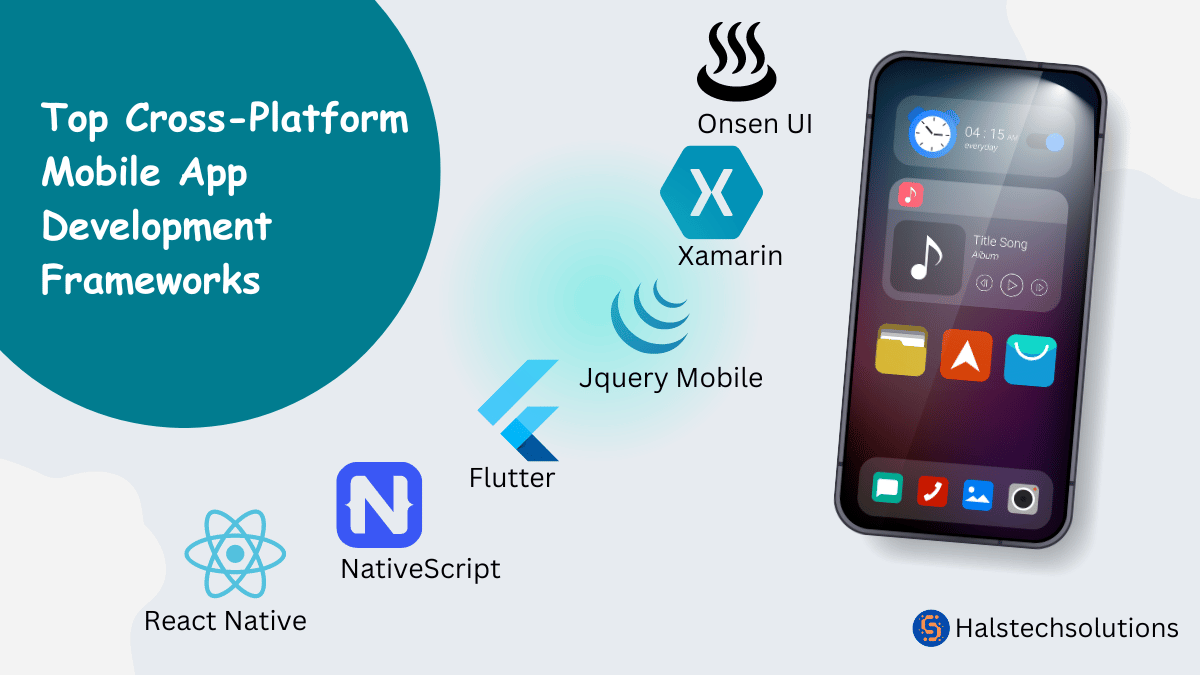Developing apps that function flawlessly on several platforms is essential in the dynamic world of mobile app development. This problem has given rise to cross-platform development frameworks, which let programmers create code only once and run it across several systems.
This is not only a time and resource saver, but it also enhances the availability of your app. In this blog, we have compiled a list of some of the best cross-platform mobile application development frameworks that help developers to build superior quality apps with rich features at an unprecedented speed.
Although there isn't a single app development framework that works for every situation, these frameworks provide various tools, libraries, and features to meet various project needs. You're sure to discover a framework that works for you, regardless of your goals—high performance, a quick development cycle, or deep integration with platform-specific capabilities.
In this blog, we will explore some of the top mobile app frameworks currently on the market. These frameworks enable experienced and inexperienced developers to produce feature-rich, intuitive, and aesthetically appealing apps quickly.
Different Types of Frameworks for Cross-Platform Mobile App Development
Hybrid App Development Frameworks
Hybrid frameworks allow developers to create mobile applications with web technologies like HTML, CSS, and JavaScript. These frameworks use a native container to render web information, which makes them cross-platform compatible. They obtain access to device functionalities by wrapping the web app within a native shell, giving consumers an experience that is very similar to that of native apps.
Examples:
Iconic, Xamarin.Forms & Apache Cordova.
Benefits:
Quick development
Code Re-usability
Unified user experience across platforms
Compiled App Development Frameworks
Compiled frameworks prioritize great performance and a natural appearance and feel. They use a shared codebase that is compiled into platform-specific native code. This strategy improves app performance and gives consumers a truly native-like interface.
Examples
Flutter, Unity (for games) & Xamarin.Native
Benefits:
Native user experience
Excellent performance
Access to platform-specific features
JavaScript-Based App Development Frameworks
JavaScript-based frameworks find a balance between native performance and code reuse. Developers create their app code in JavaScript, which allows them to launch applications on different platforms. These frameworks use a native rendering engine to ensure the app performs near native while remaining cross-platform compatible.
Examples:
React Native & NativeScript
Benefits:
Reusable code
Native API access
An intuitive user interface
Examples of Cross-Platform Mobile App Development Frameworks
Flutter
Flutter, developed by Google, has become rather popular in the cross-platform programming community. It is written in the Dart programming language and comes with a large collection of customizable widgets for making native-looking, aesthetically pleasing applications. With only one codebase, developers can create apps for iOS, Android, the web, and desktop platforms with Flutter's "write once, run anywhere" methodology. Reflectly, Alibaba, and Google Ads are a few Flutter-built apps.
Pros
Several different configurable widgets.
Outstanding results because of a compiled language (Dart).
A community that is expanding quickly.
A hot-reload function that facilitates speedy debugging and testing.
Cons
Larger app sizes
Limited access to platform-specific APIs
React Native
React Native, developed by Facebook, is one of the most popular cross-platform frameworks. It uses JavaScript and React to build native-like mobile apps for both Android and iOS. React Native has a robust community of developers and various third-party libraries, making it a powerful choice for developers. It enables the reusabilty of code components, allowing faster app development and easier maintenance. Some companies using React Native for their apps include: Instagram, Airbnb, and Facebook.
Pros
Access to native modules and APIs
Robust and active community
Fast development with hot-reloading.
Cross-platform code sharing
Cons
Possibility of performance limitations in complex apps
Some platform-specific customization may be required
Native Script
NativeScript is an open-source mobile development framework that enables developers to build truly native apps for Android and iOS using Angular, JavaScript, TypeScript. It offers direct access to native APIs and UI components, ensuring a high level of performance and user experience. Examples of apps built with Native Script include Strudel and Sycorp Calc.
Pros
Excellent performance for complex apps
Supports JavaScript, TypeScript, and Angular
Direct access to native APIs and components
Active community and plugin ecosystem
Cons
Smaller community compared to Flutter or React Native
Steeper learning curve compared to web-based frameworks
Xamarin
Xamarin, now part of Microsoft, can be used to develop cross-platform mobile apps with C# and. NET. It enables developers can share up to 90% of the code between other platforms. Xamarin offers a native user experience and direct access to platform-specific APIs, making it appropriate for sophisticated uses. Xamarin is used by apps like Microsoft Azure and Pinterest for cross-platform development.
Pros
Extensive library of pre-built components
Full access to native APIs
Strong integration with Visual Studio
Cons
Smaller community compared to JavaScript-based frameworks
Steeper learning curve for individuals not already familiar with .NET and C#
Conclusion
Deciding on which cross-platform mobile application development framework to use depends on your specific project needs, the target audience, and team expertise.
"Each framework has its advantages and shortcomings.It is, therefore important to consider factors ease of development, performance, and access to platform-specific features."
Even though the type of cross-platform framework for mobile app development you may choose could depend on your project budget, specific requirements, and project delivery timelines, insights into the most popular ones discussed in this blog can help you arrive at an informed decision.
Looking into collaborating with us? Reach out to our team to find out exactly how we can assist you achieve your mobile app development goals.Talk with us.


Latest Comments
James
Great Insights.
Comment on the blog "Exploring the Top Frameworks for Developing Cross-Platform Mobile …"